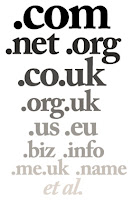Domain names – everything you need to know but you are afraid to ask
 If you are running an online business or you working online form home or you are independent internet marketer, and don’t yet have a domain name, you are probably losing thousands of dollars. If you ask why, the one possible answer is simple: because your customers will simply not feel comfortable buying from you. If you want to sell on the web you must build up your credibility and brand. Domain name is the first step in that process.
If you are running an online business or you working online form home or you are independent internet marketer, and don’t yet have a domain name, you are probably losing thousands of dollars. If you ask why, the one possible answer is simple: because your customers will simply not feel comfortable buying from you. If you want to sell on the web you must build up your credibility and brand. Domain name is the first step in that process.
So, now that you are convinced that you need your own domain, here is short basic tutorial about everything that you need to know about domain names and you are afraid to ask:
Domain name is a name that identifies one or more IP addresses. Domain names are used in URLs to identify particular Web pages. Domain names are typically categorized by their extension, which is their identifying code. The three most popular types of Top Level Domains (TLDs), which are domains that are not associated with a country, are:
.COM (Short for .commercial) – Domain names with the .com extension are by far the most popular, and can be purchased by any individual or business.
.NET (Short for .network) – This domain extension was originally designed to be used by technical Web sites. However, domains using this extension can be registered by anyone.
.ORG (Short for .organization) – Originally designated for non-profit firms and any other organizations that did not fit under the .com or .net extension, any individual or business may now register a .org domain name.
.GOV (Short for .Government) – Government agencies
.EDU (Short for .Educational) – Educational institutions
.MIL (Short for .Military) – Military
.INFO .BIZ . NAME - (Short for Information, Business, Name) – intended for individual use.
There are Country Level Domains, which use country extensions. Most of the countries have own domain extension. Countries have specific rules surrounding exactly who can register domains using their extension and for what purpose; it’s therefore important to look before you leap. Example: Nederland, for example use .nl, the United States of America use .us, United Kingdom – .uk, etc.
The Internet Corporation for Assigned Names and Numbers (ICANN), the organization responsible for the administration of TLDs worldwide, has recently approved new extensions that are not specific to any country. These are used for Alternative Domain Names, like .areo, .biz, .coop, .info, .museum, .name, .pro. Each has been designed for a specific use, and is accompanied by certain restrictions.
Although .com, .net and .org are typically the most visible and talked-about extensions, they are not the only ones available for use. From a functional perspective, country-level domains work just as well as any TLDs. Therefore, don’t necessarily settle for a TLD when you can get a better one using a different extension.
You can find more information here: http://www.icann.org/tlds/
Tags | Computers, Domain Names, Internet, Networking, Tutorials





